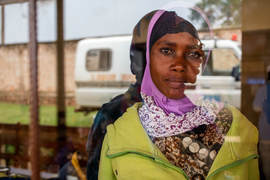 IPPF/Georgina Goodwin/Burundi, copyright: IPPF
IPPF/Georgina Goodwin/Burundi, copyright: IPPF UN Member States failed to reach a consensus on a resolution on Sustainable Cities, Human Mobility and International Migration, the main theme of the 51st Commission on Population and Development, April 9th-13th. It is the third time in the past four years that the CPD remains without agreed conclusions.
Despite excellent facilitation by South Africa, the theme of migration was an extremely complex issue which led to animated negotiations on a multitude of issues. These included human rights of migrants, regular vs. irregular migration, access to services, including sexual and reproductive health and reproductive rights. Other thorny issues were the sovereign right of states to implement commitments according to national policy, and perhaps most prominently, the parallel and ongoing negotiations on the Global Compact on Migration.
While the majority of Member States were willing to accept a compromise text developed by the Chair, the United States refused to join consensus. The US insisted they could not accept a text that contained an unqualified reference to sexual and reproductive health, since these terms are “open to many interpretations.” They also insisted on reentering the sovereignty paragraph, which functions as an escape clause, specifying the conditions under which a state is not bound by the agreement. The African Group also stated they could not join consensus, partly due to the desire for stronger language on sovereignty and partly due to opposition to the paragraph referencing the Global Compact on Migration, which they felt undermined these parallel negotiations.
In response, Tunisia made a powerful statement on behalf of a cross-regional group of 35 countries (Australia, Austria, Argentina, Belgium, Brazil, Bulgaria, Cabo Verde, Canada, Cambodia, Colombia, Cyprus, Denmark, El Salvador, Estonia, Finland, France, Germany, Greece, Iceland, Ireland, Japan, Latvia, Liberia, Luxembourg, Netherlands, New Zealand, Norway, Portugal, Philippines, Sweden, Switzerland, Spain, Tunisia, United Kingdom and Uruguay) on the critical importance of sexual and reproductive health and rights to women and girls around the world, stating:
“We believe that all people have the right to have control over and decide freely and responsibly on matters related to their sexuality, free of coercion, discrimination and violence – as a matter of social justice. ”
In closing, Natalia Kanem, the Executive Director of UNFPA, brought the focus back to the women and girls for whom the 2030 agenda is so critical, and emphasised the need and responsibility of Member States to provide policy guidance. She closed with a quote from the ICPD Programme of Action on sexual and reproductive health care and reproductive health and rights for migrant women, especially victims of sexual violence. She pointed to the commitment to advocate ever more vigorously for the sexual and reproductive health and reproductive rights of all women, adolescent girls, young people and all, as the ICPD Programme of Action and Agenda 2030 mandates.
As part of Countdown 2030 Europe, the consortium dedicated to advance universal access to family planning, Sensoa was actively involved in the preparations for the CPD, providing recommendations to the Belgian government with regards to SRHR in relation to urban growth and migration.
While the majority of Member States were willing to accept a compromise text developed by the Chair, the United States refused to join consensus. The US insisted they could not accept a text that contained an unqualified reference to sexual and reproductive health, since these terms are “open to many interpretations.” They also insisted on reentering the sovereignty paragraph, which functions as an escape clause, specifying the conditions under which a state is not bound by the agreement. The African Group also stated they could not join consensus, partly due to the desire for stronger language on sovereignty and partly due to opposition to the paragraph referencing the Global Compact on Migration, which they felt undermined these parallel negotiations.
In response, Tunisia made a powerful statement on behalf of a cross-regional group of 35 countries (Australia, Austria, Argentina, Belgium, Brazil, Bulgaria, Cabo Verde, Canada, Cambodia, Colombia, Cyprus, Denmark, El Salvador, Estonia, Finland, France, Germany, Greece, Iceland, Ireland, Japan, Latvia, Liberia, Luxembourg, Netherlands, New Zealand, Norway, Portugal, Philippines, Sweden, Switzerland, Spain, Tunisia, United Kingdom and Uruguay) on the critical importance of sexual and reproductive health and rights to women and girls around the world, stating:
“We believe that all people have the right to have control over and decide freely and responsibly on matters related to their sexuality, free of coercion, discrimination and violence – as a matter of social justice. ”
In closing, Natalia Kanem, the Executive Director of UNFPA, brought the focus back to the women and girls for whom the 2030 agenda is so critical, and emphasised the need and responsibility of Member States to provide policy guidance. She closed with a quote from the ICPD Programme of Action on sexual and reproductive health care and reproductive health and rights for migrant women, especially victims of sexual violence. She pointed to the commitment to advocate ever more vigorously for the sexual and reproductive health and reproductive rights of all women, adolescent girls, young people and all, as the ICPD Programme of Action and Agenda 2030 mandates.
As part of Countdown 2030 Europe, the consortium dedicated to advance universal access to family planning, Sensoa was actively involved in the preparations for the CPD, providing recommendations to the Belgian government with regards to SRHR in relation to urban growth and migration.

 RSS Feed
RSS Feed